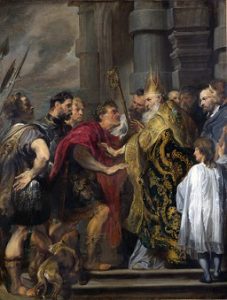
St. Ambrose of Milan
Early Church Father and Doctor of the Church
excerpts from a Biography written by Marcellino D’Ambrosio (Ph.D.) and Wikipedia
St. Ambrose was born around 339 to the Roman prefect of Gaul. Following his father’s footsteps, Ambrose embarked upon a career in law and politics, becoming the imperial governor of Northern Italy by 370 AD. When the episcopal see of Milan became vacant in 374, the people demanded that St. Ambrose be their bishop. The neighboring bishops and the Emperor convinced him to accept this call as the will of God, and so the catechumen Ambrose was baptized and ordained first deacon, then priest, then bishop, all in a single week!
His deep spirituality and love of God’s Word married together with the oratorical skill acquired in law and politics made St. Ambrose one of the greatest preachers of the early church. St. Ambrose proved to be a fierce opponent of heresy, paganism, and hypocrisy.
In 385 or 386 AD the emperor and his mother Justina, along with a considerable number of clergy and laity, especially military, professed Arianism. They demanded two churches in Milan, one in the city (the Basilica of the Apostles), and the other in the in the suburbs (St. Victor’s), to the Arians. Ambrose refused and was required to answer for his conduct before the council.
Bishop Ambrose declared:
“If you demand my person, I am ready to submit: carry me to prison or to death, I will not resist; but I will never betray the church of Christ. I will not call upon the people to succor me; I will die at the foot of the altar rather than desert it. The tumult of the people I will not encourage: but God alone can appease it.”
St. Ambrose prevailed, preventing the churches from falling to the Arians.
He battled to preserve the independence of the Church from the state and courageously excommunicated the powerful Catholic Emperor Theodosius I for the massacre of 7000 people at Thessalonica in 390. Ambrose told Theodosius to imitate David in his repentance as he had imitated him in guilt. Ambrose readmitted the emperor to the Eucharist only after several months of penance. Ambrose also forced Theodosius to retreat from compensating a Jewish community in Mesopotamia when a synagogue was burnt down by militant Christians.